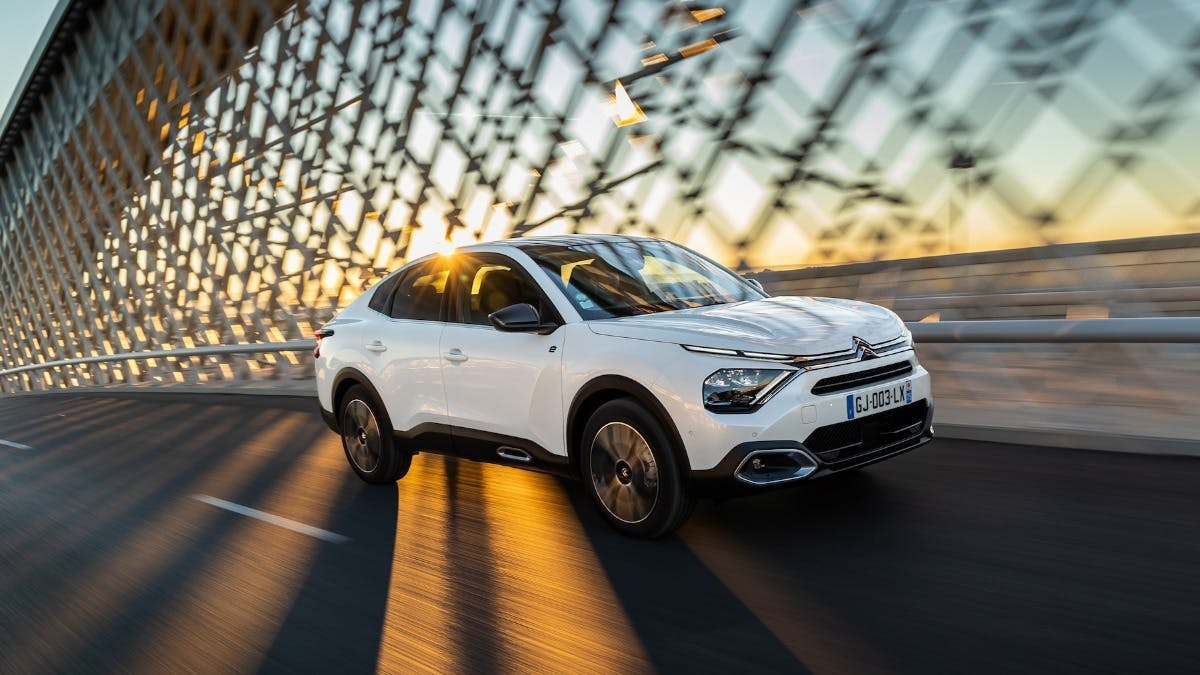Electric vs. Hydrogen Cars

-
Are electric or hydrogen cars the future?
The UK’s roads have drastically changed over the last few years with more and more drivers choosing EVs.
Zero-emission driving gains more popularity by the day with green license plates being a common sight. But as EV technology develops, so do other types of zero-emission powertrains like hydrogen fuel cell cars.
We’re delving into the details to compare electric vs. hydrogen cars. Whilst there aren’t many hydrogen models to choose from and the infrastructure is lacking, hydrogen fuel cell cars do offer some strong benefits.
But this is potentially a long way off so electric cars are your best bet for zero-emission driving for the foreseeable future!
Check out our in-depth analysis of both hydrogen vs electric cars to find out how they both work, their main benefits, the main considerations and the future of driving in the UK.
-
Electric vs. Hydrogen cars - how they work
-
How EVs work

Electric powertrains generate power with a large battery and an electric motor. The lithium-ion battery holds charge, which is then turned into electric power by the motor. This electric power is pushed into the wheels to generate motion.
-
EV batteries
Electric cars use large lithium-ion batteries. Just like you have in your phone but much more powerful! They’re rated in kilowatt-hours (kWh), with higher ratings meaning a larger battery capacity and therefore more driving range.
Typical battery sizes are around 60kWh (which will give around 200 miles of range depending on the size of the car.)
Read our guide to electric car batteries for a more detailed look at how they work, battery types, charging and more.
-
EV motors
An EV’s motor converts the battery's electricity into power that turns the wheels. Typically the motors are AC so they use an inverter to turn the DC current from the battery into the power that turns the wheels.
Charging your EVThe battery in an EV needs to be charged regularly to regain power. Just like a petrol car needs fuel, electric cars need electricity to charge the battery.
-
Charging an EV
You simply plug it in at home, or at a public charger, and wait anywhere from 30 mins to 7 hours for a full charge.
Rapid chargers typically offer an 80% charge in under an hour, whilst charging at home can take as long as 7 hours. It all depends on the type of charger (whether that’s a wall box or charge point) and your EV’s charge rating.
Electric cars also use regenerative braking to add extra power to the battery without plugging in. The motor recoups energy that is usually lost when you’re braking or slowing down and turns it into battery power.
This happens in the background when you’re driving and can increase your range by a small but noticeable amount if you drive carefully.
-
How hydrogen cars work

Hydrogen cars are a brand-new type of powertrain with similarities to both fuel and electric cars. They run on hydrogen fuel cells that can be easily refuelled in a matter of minutes (like a petrol or diesel car) and they produce zero tailpipe emissions (like an EV.)
The only thing that hydrogen cars produce as a byproduct is a small amount of water vapour.
-
How hydrogen fuel cells work
Hydrogen fuel cells are complex devices that convert chemical energy to electric power. It splits the hydrogen atoms into protons and electrons, with the electrons being pushed through a circuit to create electricity. This process is known as electrolysis.
It’s this electric current that’s used to power the car, creating zero tailpipe emissions just like an electric vehicle. The only byproduct is a small amount of water!
-
Refuelling hydrogen fuel cells
Hydrogen cars are refuelled in a very similar way to petrol or diesel engines. You visit a hydrogen fuelling station and connect the hose to your car. Pure hydrogen is then pushed out of a high-pressure tank into your car's fuel cells and you’re ready to go!
Unlike an EV, which can take an hour or two to top up, hydrogen cars are fully refuelled in a matter of minutes.
-
Electric vs. Hydrogen cars - main benefits
-
Main benefits of EVs

There are plenty of benefits to driving an EV. This includes:
-
Zero tailpipe emissions
The electric powertrain doesn’t produce any emissions from the tailpipe, perfect for inner-city living.
-
Cheaper to run
Electric cars are typically cheaper to run than petrol or diesel equivalents, especially when charged at home or work.
-
Less maintenance needed
Electric powertrains have fewer moving parts compared to internal combustion engines. Fewer things can go wrong meaning you’ll have less costly maintenance to contend with!
-
Grants, incentives & exemptions
If the above EV benefits are not enough to entice you, there are plenty of government grants and incentives that make entering electric driving much easier. This includes money towards wall box installation as well as exemptions from the Congestion Charge.
For more information, read our full guide to electric car grants and incentives.
-
Main benefits of hydrogen

There are also plenty of benefits to driving a hydrogen-powered car too.
-
Eco-friendly fuel
It’s an eco-friendly fuel that doesn’t cost a lot to produce. There are plenty of environmentally conscious ways to source hydrogen, including renewable energy. Although the most common production method uses fossil fuels.
-
Plenty of hydrogen to go around
Hydrogen is the most abundant element in the universe so we’ll never run out or have to come up with new ways to source it.
-
Zero-emission driving
This type of powertrain also produces zero tailpipe emissions, other than a little bit of water vapour.
-
Instant refuelling
The same emissions as an EV but with the speed of a petrol car. Refuelling hydrogen fuel cells is as quick and easy as refuelling your petrol tank.
-
Longer driving range
Hydrogen cars tend to offer around 300 miles of driving range before refuelling, similar to petrol and diesel vehicles.
-
Grants, incentives & exemptions
Hydrogen fuel cell cars are also eligible for many of the same grants, incentives and exemptions as EVs. You should be able to make the most of these as long as the eligibility criteria states the car has to produce zero tailpipe emissions. E.g. Hydrogen cars won’t have to pay road tax until 2025.
-
Electric vs. Hydrogen cars - main considerations
-
Main considerations for EVs

There are a few points to consider when it comes to driving and owning an EV.
-
Recharging
Charging is quite different to refuelling. You can do it at home, but you need a wall box installed for fast charging or you can use a slow-charging wall socket adapter.
Public chargers are different to petrol stations, as you may have to have an account, subscription or network card to use them.
Members typically pay monthly network subscriptions (around £6-£8 a month) to enjoy lowered charging costs. There are also various networks so you’ll need to be signed up to them all to use them.
-
Living situation
To make driving an EV as convenient and simple as possible, you’ll have to have an easy way to regularly charge your vehicle. One of the most popular ways is through a wall box at home as this offers quicker charging. But you will have to have access to a driveway or some type of parking very close to your home for a wall box.
Some apartments and flats may offer EV charging in a communal parking area. If you live in a flat or apartment you can even apply for the EV chargepoint grant but you’ll need permission from the relevant party before you’re approved.
Read our guide to the Plug-in Grant for more information.
Don’t worry as you can make EV ownership work if you don’t have access to a charge point at home. There are plenty of other ways you may be able to get a regular charge, including at a nearby public charger, at work or a local supermarket.
For a more in-depth explanation, read our guide on electric car charging at home with no driveway.
-
Charging best practices
There are also some things you have to keep in mind when charging to prolong your EV’s battery health.
The most important one is charging from 10%-80% rather than fully depleting and then charging to 100%. Completing a full charge cycle ever-so-slightly diminishes your battery’s capacity, so constantly completing charge cycles will eventually affect your battery’s health.
For more information read our EV charging best practices and tips guide.
-
Costs
There are plenty of money-saving benefits to driving an electric car but they can be more expensive to buy (or lease). This is due to the level of technology inside an EV, on top of the uptake of electric cars.
Whilst they are gaining in popularity, EVs are still more expensive to make at the moment. But once EVs overtake internal combustion engine (ICE) vehicles their upfront cost should drop.
Electric car sales beat diesel sales for the first time ever in December 2022 and considering how much the prices of electric cars have dropped over the last 10-15 years as production increased, we’re not far off.
-
Driving style
There are also considerations when it comes to your daily driving style. Quick acceleration, high-speed driving and harsh braking will burn through your driving range much quicker, just like in an ICE vehicle.
Instead, driving more considerately will prolong your EV’s range, battery health, tyres and more.
The majority of electric cars use a regenerative braking system. In short, the electric motor reclaims some of the energy that would be lost when braking and decelerating and converts it into electricity to store in the battery.
That means you’re always regaining a bit of charge when you’re out driving. If you’re very mindful of this system you may be able to regain a decent amount of charge!
-
Brake, tyre & suspension wear
Regenerative braking is important for EVs so that makes staying on top of brake wear even more vital. Inefficient brakes mean less regenerative braking, in turn increasing the need to charge.
Electric cars are heavier than comparable petrol or diesel vehicles due to their large lithium-ion battery. This means that tyres and suspension are put under more pressure so you may have to change them more regularly than you would in an ICE vehicle.
-
Main considerations for hydrogen

Car shown is not a hydrogen model.
-
Expensive
Hydrogen fuel cell cars are still in the early days of their technology. They are more difficult and costly to produce which means they’re more expensive for the consumer.
Until ample infrastructure and government support inspire greater uptake, hydrogen cars are likely to be expensive for the foreseeable future.
-
Hydrogen fuel availability
There’s an extremely limited number of hydrogen fuelling stations across the UK. That limits ownership to people who live in the vicinity of a hydrogen station. There are a few dotted around London with the rest spread out across the country.
There are plans to introduce more across the UK but right now it’s not viable for most drivers.
-
Hydrogen storage
A reason for the lack of stations may have something to do with the way hydrogen has to be stored and transported for safety reasons. This added complexity comes with added costs too.
It also needs to be extremely compressed so the network used for distribution would need to be able to safely and efficiently handle high-pressure gas.
-
Fossil fuels
Even though hydrogen is the most abundant element in the universe, our current methods of extraction rely heavily on fossil fuels. There are renewable ways of producing hydrogen but these are yet to be adopted on a larger scale.
-
Electric vs. Hydrogen cars - the future of driving

-
Are hydrogen cars the future?
Hydrogen fuel cell cars simply aren’t viable as things stand. The technology and infrastructure just aren’t there.
There’s only a limited number of models available and they’re more expensive than comparable electric cars.
Whilst they emit zero tailpipe emissions and offer ‘clean’ driving, the current processes for hydrogen extraction rely heavily on the use of fossil fuels. What’s the point of using a clean fuel source if it’s produced with polluting fossil fuels?
Several complex issues currently prevent their growth.
But once there is enough interest and development in the technology, hydrogen fuel cell cars may see a rise in popularity just like EVs did.
Ten years ago electric cars were a rare sight on the roads. But in 2023 you can spot countless EVs on every journey.
So given enough time hydrogen fuel cell cars may one day eclipse traditional EVs. Only if hydrogen extraction methods are cleaned up though.
This will be a large barrier as electric car uptake is spurred on heavily by eco-conscious drivers. So once this is tackled, and hydrogen is easily available across the country, there’s no reason why hydrogen-powered vehicles won’t surpass EVs.
They address the two main gripes that the modern driver has about electric cars: they have a larger driving range and can be refuelled in a matter of minutes.
But for the time being, electric cars come out on top.


